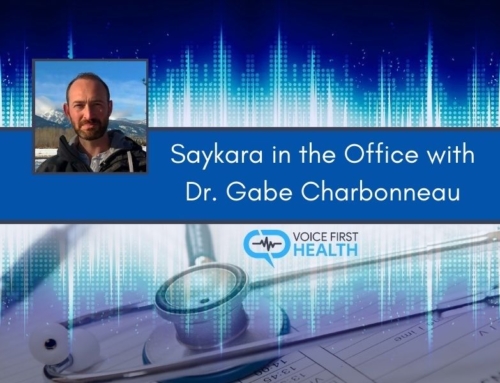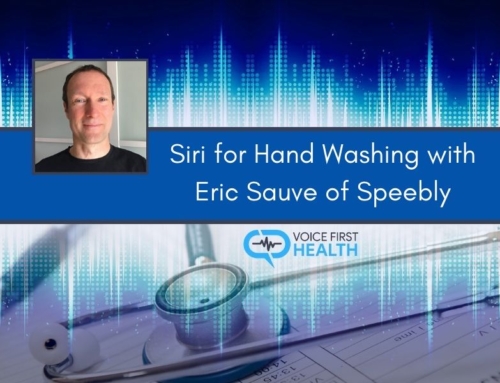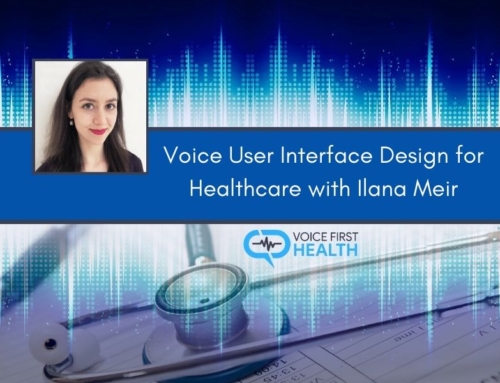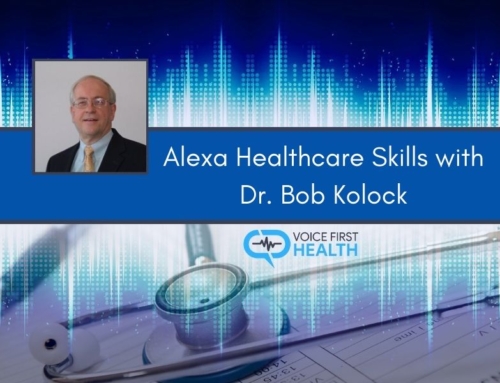VFH Episode 57
In this episode, Teri will share a recording of the presentation he did at Project Voice 2020.
Project Voice 2020 was a fantastic event and Teri had the opportunity to participate in a number of different talks including a workshop that he gave with his colleagues Harry Pappas, David Box, and Ilana Meir.
Key points from the Presentation!
- Teri’s ideas around what is the opportunity right now for voice technology specifically in healthcare.
- Designing for voice in healthcare.
The Basics for Voice for Healthcare
- Teri started the presentation by playing a clip from the movie Elysium where a little girl with Acute Lymphoblastic Leukemia is put on some futuristic home-based medical machine that completely heals her of the disease.
- With voice technology and how it’s penetrating the market where we have access to incredible technology, Teri sees it as the primitive version of the technology in that movie scene.
Where We Are and What’s Happening Next
- Teri shares a story about when he was ten and his parents got their first personal computer (a Tandy computer from RadioShack).
- They showed Teri how to use it and he spent a long time typing on it.
- Technology evolved and we went from that type of computer to the newer models we have now.
- 12 years ago Steve Jobs introduced the iPhone, and now we have a computer in the palm of our hands.
- All those technologies have several things in common including the keyboard and an interface.
- For the first time ever, we don’t need an interface or a device because we can use our voice as the device sits in the background. We can communicate in the most natural way that we know how to communicate using our voices.
- Voice is extremely efficient and the speed at which we can communicate a message when we are speaking is much faster than if we type.
- With voice we can multitask, and because of that, voice will be the next operating system.
- Research on the penetration rates of consumer technologies over the course of history shows that smart speakers are being adopted at a rate more rapid than any consumer technology in our history, including mobile phones.
- Scenario: What if we could have a physician, dietician, physiotherapist, and nurse living in our homes 24/7 through the kind of technology portrayed in the movie Elysium?
- That kind is scenario is what gets Teri excited and he believes that we are starting to see the primitive kindlings of that kind of healthcare team in the home.
Opportunities for Healthcare in the Home
- It’s often been said that the right healthcare system is when you’re getting the right care, at the right time, and in the right place.
The Right Care:
- If one doesn’t have any medical training and they’re feeling sick, often times they’re not sure what the right care is.
- They can’t tell whether to see a doctor, take some pills or get some therapy. The way they can figure that out without accessing a healthcare system is through voice. For example, one can talk to their smart assistant which will then tap into AI physicians, nurses, dieticians, etc. who can answer common health questions.
- Teri believes that will mean voice assistants becoming care providers in the home.
The Right Time:
- If one feels sick, they may not know when to see a doctor.
- Scenario: What if that person could ask their voice assistant for help and the voice assistant could start to triage and assess the urgency? Once it does that effectively, it could start to direct the resources of the population.
- The voice assistants will be doing that at an individual level in each home.
The Right Place:
- One of the biggest issues for Canadians and people worldwide, is that there is so much demand on the healthcare system that patients will often go to the emergency department for something like a cold, because they can’t access their family doctor. It can take weeks to see a family doctor.
- That is a huge issue in the Canadian healthcare system, and so directing people to the right place is critical.
- The question that lingers is, “How does a person know where to go when they don’t have the medical training?” because there are lots of different options for where a person could get some medical care depending on the issue.
- Scenario: What if voice assistants acted like a tour guide for a healthcare system helping people to navigate through the system?

The Pillars of Creating a Healthcare Application
- Right now it’s very easy for someone to create a healthcare application that allows one to educate their patients, meaning it’s a one-way communication. A great example is Teri’s health oriented flash briefings.
- Another great example is how someone can talk to a smart assistant and ask Diabetes related questions which the assistant will answer.
- The only problem is, there’s very little of a clinical component to that, and so it doesn’t actually provide any diagnosis or treatment.
- We can’t rely on smart devices to treat a disease but Teri believes in the future we will be relying on the devices to treat us.
Aging in Place
- This refers to, for example, being able to easily and seamlessly connect with family members through a voice assistant or being able to reminisce about events by talking to a voice assistant to remind us about something that happened in the past.
Physician Notes
- This is one of the biggest pain points for physicians and if somebody can solve it effectively, it’s the holy grail.
- Having a voice controlled EMR with AI enriched interactions will also be great breakthrough.
Vocal Biomarkers
- It’s an exciting area. Entities like the Mayo Clinic are studying biomarkers for voice so that a person could just be speaking and the smart speaker could pick up a health condition in the person.
- They are looking at coronary artery disease and seeing if they can pick it up from a person’s voice. The technology can also be leveraged for other types of diseases like Parkinson’s and others.
Patient-Centered Healthcare
- Healthcare systems are a maze that patients have a difficult time trying to navigate. They’re often times not sure where to go and if they do go somewhere, they don’t know where to go next.
- Teri thinks we should start having smart speakers in the home where a patient can be in the driver’s seat. Patients can access the voice assistants when they need to, get some advice, and when necessary, have their supporting crew of physicians to tap into when they need them.









